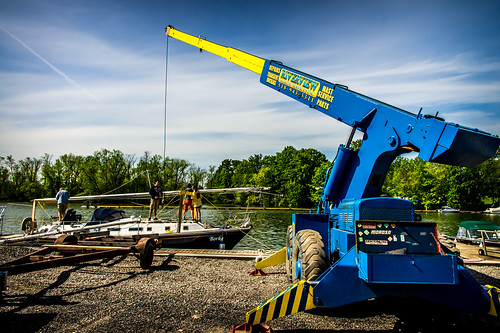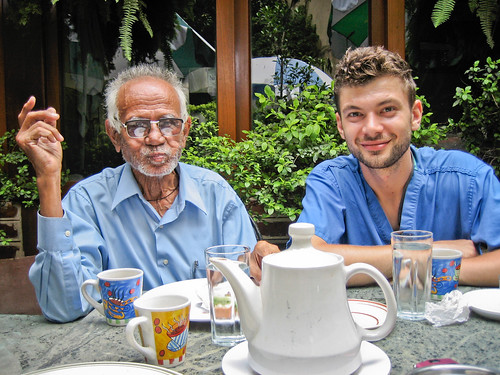In the past couple days, I made a new Couch Surfing friend in North Carolina, ate at two locavore restaurants, boarded a plane in the birthplace of Pepsi (New Bern, NC) for the hometown of Coca Cola (Atlanta) and then flew back to SF, where I am now.
Our little shakedown cruise of a 1,000 miles covered many aspects of a boat’s lifecycle.
- We stepped up Borka’s two masts:

- We traveled through canals and bridges and learned to communicate with transport operators. I got to play with VHF radios. Here’s an example exchange :
“Dismal Swamp Canal Bridge, Dismal Swamp Canal Bridge … this is sailboat Borka heading southbound.”
The bridge operator would respond; the bridge would lift, rotate, hinge, creak, and open …
- We spent nights out in the ocean or in marinas, docking or mooring. We even spent a night at a crab cracking restaurant in Deale, MD on the Chesapeake after docking for dinner and then staying the night.
- At the end, we lifted Borka out of the water and left her on drydock for the hurricane season.

***
For the duration of the trip it felt as though the boat had become an extension of our bodies, our own little universe, a floating home. The rituals of mooring, jumping off to catch the lines, keeping everything orderly an neat, and maintaining readiness to react to unexpected changes in wind, current, or both. Taking precautions in high wind and rough water to keep the life vest on when above board, helming or climbing on deck; being constantly aware of our GPS coordinates.; but mostly, just making sure to take advantage of the down time, to read, to tan, to relax, to take pictures and look around.
***
From the water, you get a different perspective of land. Nuclear power plants hide in the thicket of woods from the road, but can’t hide from the bodies of water that cool them. We passed Indian Point on the Hudson River in NY State, Hope Creek and Salem Reactors on the Delaware River which provide 3/8th of NJs electricity, and the Calvert Cliffs Nuclear Power Plant on the Chesapeake in Maryland.
***
I’ve been close to Army’s machines of war before, but this is the first time I got as cozy with the Navy:
***
The experience of sailing at night on the open ocean (albeit not far from land) was also exhilarating. I made practical use of the stars for navigation, setting our bearing using the compass first, but then taking an object in the sky as heading reference.  The vastness punctuated by lights evoked a parallel to wandering the open playa during early days of Burning Man. Occasionally you see another group of lights saunter on their own path across the darkness. The wonderfully illuminated and decorated ships seemed like elaborate art cars. Massive fishing vessels, with large stabilizing booms out to the sides and cranes to haul their catch on board, bright sodium bulbs, or flashing navigation LEDs, and large mesh nets swaying in the wind.  Off in the distance to our right the lights of Atlantic City and the New Jersey coast (including a massive LED screen you could see from 4 miles away) buzzed with activity resembling the esplanade. This was impossible for me to photograph.  And I felt as I sometimes feel at magnificent moments: I can’t wait to get back to the real world and tell my friends about it.
***
At the mouth of Alligator River we met a crazy dane, Henning Bohm who has been sailing solo for 45 years. After his 4th heart attack, he finally qualified for a pension from the Danish government and freedom from his construction management job. Â He asked his doctor for the hard truth and learned he has less than a 25% chance of living out a year. Â Henning took this news in stride, sold all of his stuff, bought a boat and sailed West across the North Atlantic against the prevailing trade winds.
He holed up for the winter at a marina in Connecticut where his boat was being repaired. He wanted it in peak shape so that he could sail it to the Caribbean and wither away there … or if his heart held up, to sail back to Denmark through a crazy counterclockwise loop across the whole Atlantic (east from the Caribbean’s West Indies to the Canary Islands and north triumphantly back home.)
Unfortunately Neptune had other things in mind for Henning: straight out of gate his autopilot broke (which is a key feature for someone sailing solo), set his heater ablaze in the ocean (on which Henning emptied his drychem fire extinguisher), and most spectacularly, ripped off his steering wheel, leaving Henning without a means of pointing the boat (there was no backup rudder.) Henning had to call “Mayday Mayday Mayday” over the radio and a few hours later the Coast Guard showed up (20 miles off shore) and towed him back in for more repairs.
When Henning set out again, he was aware of the NOAA advisories of strong winds. But such trifles usually don’t bother him since he likes to sail fast, and this is how he ended up in the path of Hurricane Alberto (the first of 2012) outside of Cape Hatteras, which is known as the “Graveyard of the Atlantic”. It came on so suddenly that he didn’t even have a chance to bat down his hatches or pull down his sail. It also got dark. He just strapped himself in the cockpit and faced what he called “a blindfolded ride on a roller coaster” which lasted for over 12 hours. He lay down in the cockpit, sprawling to stay put, bruising most of his body, barely keeping his head out the water (as both the boat salon and the cockpit were filling with water from crashing waves) and trying to steer into the wind (which he could not see, but could only hear the sails.) Â “In my 45 years of sailing, this is the first time I was truly scared for my life.”
When the hurricane strength winds let up a bit, he tried to come ashore at a nearby harbor, but because his engine was busted, he could not fight the SSW wind and had to retreat 100+ miles back north to Hampton, MD. There he bailed 288 buckets of water from the boat, using a hand pump 80-90 times to fill each bucket (when the water level got too low to scoop.) His bilge pumps failed when their air intakes were also inundated. The good news was that his cat, Felix, survived.
Henning sailed south again, using a safer path. “‘You’re too old to fight the ocean, try the intracoastal,’ they told me. And I did.” Â He felt very tired but let on. Then he woke up suddenly, “in the middle of the day, with my clothes off, laying in bed, and the boat was still sailing. I thought it was a dream, so I went back to bed. Then I woke up again and looked around. Everywhere, swamp, swamp, swamp. Must be a nightmare! So, I went back to bed again.” When he finally woke up, he acknowledged the reality of having run aground. In trying to pull it out, he tore his Genoa Sheet (trying to jerk himself off the bank.) When high tide came, he was towed by a friendly boat into the nearest marina.
The Coast Guard was summoned a second time. This time they took Henning to a hospital. Â Apparently he lost of a lot of blood to internal bleeding and they gave him a transfusion.
When we pulled into the Alligator River Marina, Henning approached us. When we asked, “how are you doing?” He responded, “Oh … Not so well” and told us this story adding that he has been staying put for two weeks trying to regain his strength.
If you can read Danish or know a computer that can, you can read his own account of the events on his facebook fan page (closed).
I got an audio recording of Henning telling this story, so when I feel up to editing it, I will post it here. We helped Henning deal with his ripped sheet, invited him to dinner, and inadvertently witnessed his internal bleeding. One side of Henning’s mouth had no teeth from above and the other from below. I came to think of his smile as a Yin and Yang.
We met other interesting characters on this trip, but Henning wins first place.
***
You might also like :
- Our friends Tara and Sasha’s sailing blog.
- Animated guide to sailing knots.
- The Sailing Anarchy blog.
















